Filter by
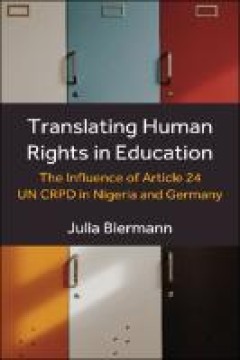
Translating human rights in education : the influence of Article 24 UN CRPD i…
The 2006 United Nations Convention on the Rights of Persons with Disabilities (UN CRPD) is the first human rights treaty to explicitly acknowledge the right to education for persons with disabilities. In order to realize this right, the convention’s Article 24 mandates state parties to ensure inclusive education systems that overcome outright exclusion as well as segregation in special educat…
- Edition
- 2
- ISBN/ISSN
- 9780472902705
- Collation
- xv, 206p.
- Series Title
- -
- Call Number
- 371.909669 TRA b
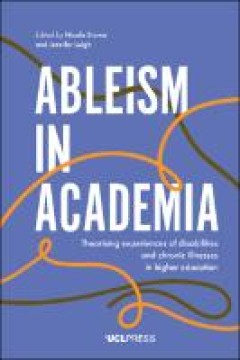
Ableism in Academia : Theorising experiences of disabilities and chronic illn…
Rather than embracing difference as a reflection of wider society, academic ecosystems seek to normalise and homogenise ways of working and of being a researcher. As a consequence, ableism in academia is endemic. However, to date no attempt has been made to theorise experiences of ableism in academia. Ableism in Academia provides an interdisciplinary outlook on ableism that is currently missing…
- Edition
- -
- ISBN/ISSN
- 9781787354975
- Collation
- 241p. ; ill.
- Series Title
- -
- Call Number
- 378.12 NIC a
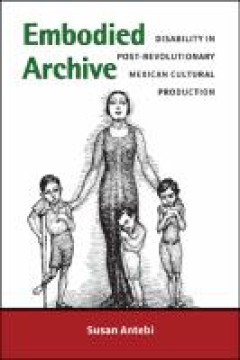
Embodied archive: disability in post-revolutionary Mexican cultural production
"Embodied Archive focuses on perceptions of disability and racial difference in Mexico’s early post-revolutionary period, from the 1920s to the 1940s. In this period, Mexican state-sponsored institutions charged with the education and health of the population sought to strengthen and improve the future of the nation, and to forge a more racially homogeneous sense of collective identity and hi…
- Edition
- -
- ISBN/ISSN
- 9780472902422
- Collation
- 283 p.: ill.
- Series Title
- Corporealities: Discourses Of Disability
- Call Number
- 305.908097209041 ANT e
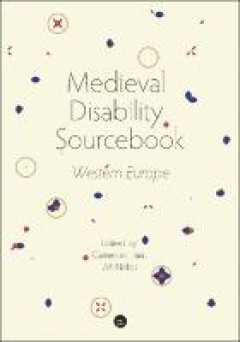
Medieval disability sourcebook : Western Europe
The field of disability studies significantly contributes to contemporary discussions of the marginalization of and social justice for individuals with disabilities. However, what of disability in the past? The Medieval Disability Sourcebook: Western Europe explores what medieval texts have to say about disability, both in their own time and for the present. This interdisciplinary volume on med…
- Edition
- -
- ISBN/ISSN
- 9781950192748
- Collation
- 495 p. : ill.
- Series Title
- -
- Call Number
- 305 MCN m
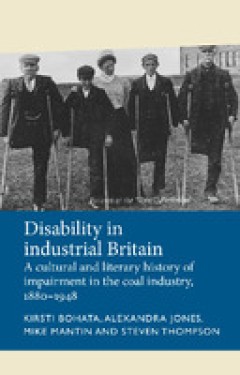
Disability in industrial Britain : a cultural and literary history of impairm…
Coalmining was a notoriously dangerous industry and many of its workers experienced injury and disease. However, the experiences of the many disabled people within Britain’s most dangerous industry have gone largely unrecognised by historians. This book examines the British coal industry through the lens of disability, using an interdisciplinary approach to examine the lives of disabled miner…
- Edition
- -
- ISBN/ISSN
- 9781526124326
- Collation
- 277 p. : ill.
- Series Title
- -
- Call Number
- 362 BOH d
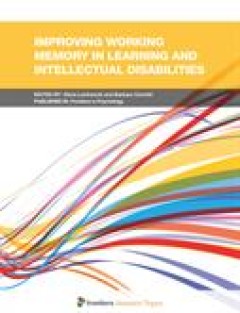
Improving working memory in learning and intellectual disabilities
The last forty years of research have demonstrated that working memory (WM) is a key concept for understanding higher-order cognition. To give an example, WM is involved in reading comprehension, problem solving and reasoning, but also in a number of everyday life activities. It has a clear role in the case of atypical development too. For instance, numerous studies have shown an impairment in …
- Edition
- -
- ISBN/ISSN
- 9782889198979
- Collation
- 158p.: ill.
- Series Title
- -
- Call Number
- 370.15 IMP i
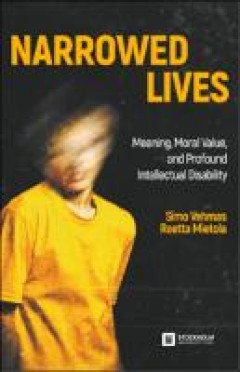
Narrowed lives : meaning, moral value and profound intellectual disability
What is day-to-day life like for people with profound intellectual and multiple disabilities who live in group homes? How do they express their desires and wishes? How do care workers think about them and treat them? Do they have basic rights to activities most of us take for granted: activities like sociability, sexuality, and moral affirmation? Narrowed Lives is an illuminating portrait of wh…
- Edition
- -
- ISBN/ISSN
- 9789176351482
- Collation
- xxii, 252p.:
- Series Title
- -
- Call Number
- 362.41092 VEH n
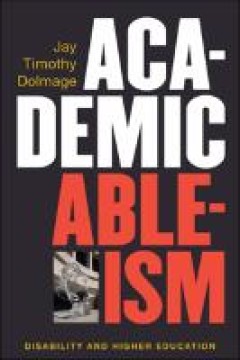
Academic ableism: Disability and Higher Education
Academic Ableism brings together disability studies and institutional critique to recognize the ways that disability is composed in and by higher education, and rewrites the spaces, times, and economies of disability in higher education to place disability front and center. For too long, argues Jay Timothy Dolmage, disability has been constructed as the antithesis of higher education, often pos…
- Edition
- -
- ISBN/ISSN
- 9780472123414
- Collation
- x, 244p.: ill.
- Series Title
- -
- Call Number
- 378.0087 DOL a

Perspectives and research on play for children with disabilities : collected …
Perspectives and research on play for children with disabilities. Collected Papers. This book includes eight chapters reflecting various approaches towards the theme of play for children with disabilities that characterised the work of the members of the COST Action TD1309 “LUDI–Play for Children with Disabilities”: barriers and facilitators to play, guidelines on accessibility and usabil…
- Edition
- -
- ISBN/ISSN
- 9788395669613
- Collation
- XVI, 189 p.
- Series Title
- -
- Call Number
- 371.9 BUL p
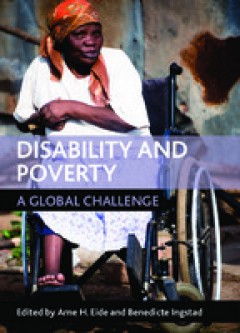
Disability and poverty : a global challenge
This book is about being disabled and being poor and the social, cultural and political processes that link these two aspects of living in what has been characterised as a “vicious circle” (Yeo & Moore 2003). It is also about the strengths that people show when living with disability and being poor. How they try to overcome their problems and making the best out of what little they have. Th…
- Edition
- -
- ISBN/ISSN
- 9781847428851
- Collation
- -
- Series Title
- -
- Call Number
- 362.4 DIS d
 Computer Science, Information & General Works
Computer Science, Information & General Works  Philosophy & Psychology
Philosophy & Psychology  Religion
Religion  Social Sciences
Social Sciences  Language
Language  Pure Science
Pure Science  Applied Sciences
Applied Sciences  Art & Recreation
Art & Recreation  Literature
Literature  History & Geography
History & Geography